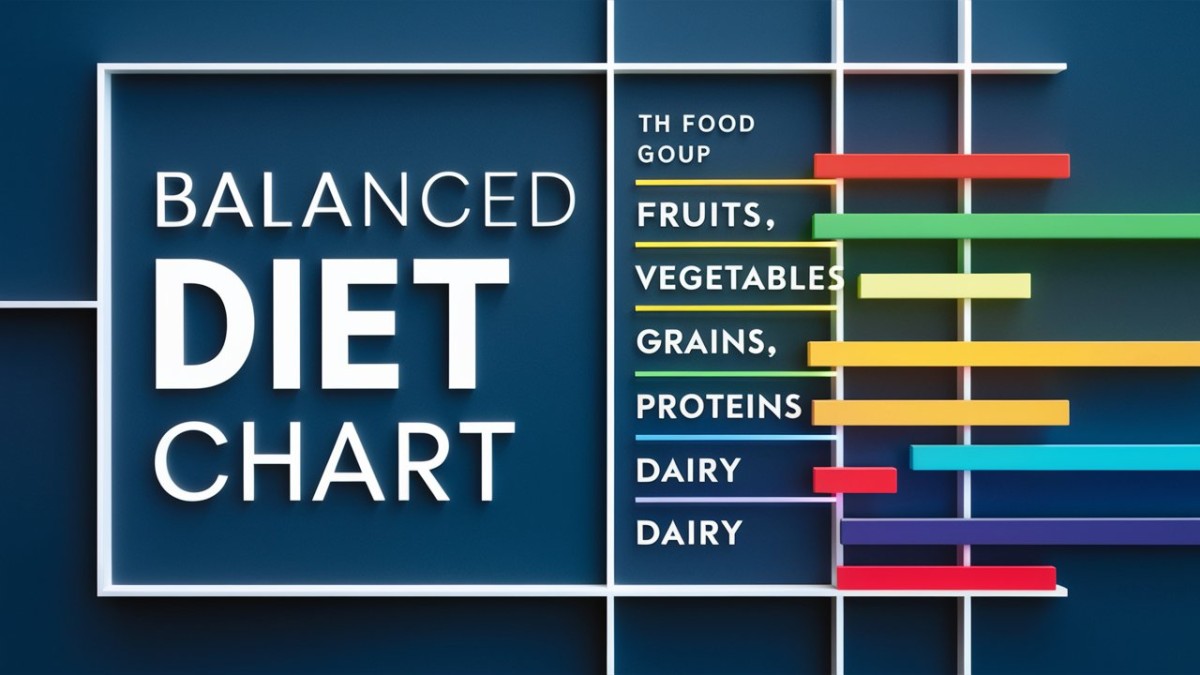A balanced diet that provides essential supplements for proper bodily function is necessary to maintain overall health and well-being.
A well-modified balanced diet is still essential regardless of your goals—maintaining or gaining weight or creating calorie-counting regimens for various age groups.
What is a Balanced Diet?
A balanced diet includes a variety of foods in the right proportions such as carbohydrates, proteins, fats, vitamins, minerals, and water to promote your overall health by meeting your body requirements along with supporting your well-being by avoiding all types of nutritional deficiencies. The nutritional requirements for children and adults may vary as per their age so there is an individual diet plan for both children and adults. Here are the basic guidelines for you to reach your body's nutritional requirements
Category |
Age Range |
Calorie Range |
| Children (Sedentary) | 2–8 years | 1,000 – 1,400 |
| Children (Active) | 2–8 years | 1,000 – 2,000 |
| Females (9–13 years) | 9–13 years | 1,400 – 2,200 |
| Males (9–13 years) | 9–13 years | 1,600 – 2,600 |
| Females (Active, 14–30 years) | 14–30 years | 2,400 |
| Females (Sedentary, 14–30 years) | 14–30 years | 1,800 – 2,000 |
| Males (Active, 14–30 years) | 14–30 years | 2,800 – 3,200 |
| Males (Sedentary, 14–30 years) | 14–30 years | 2,000 – 2,600 |
| People (Active, 30+ years) | 30 years and over | 2,000 – 3,000 |
| People (Sedentary, 30+ years) | 30 years and over | 1,600 – 2,400 |
Key Components Of Balanced Diet:
Carbohydrates:
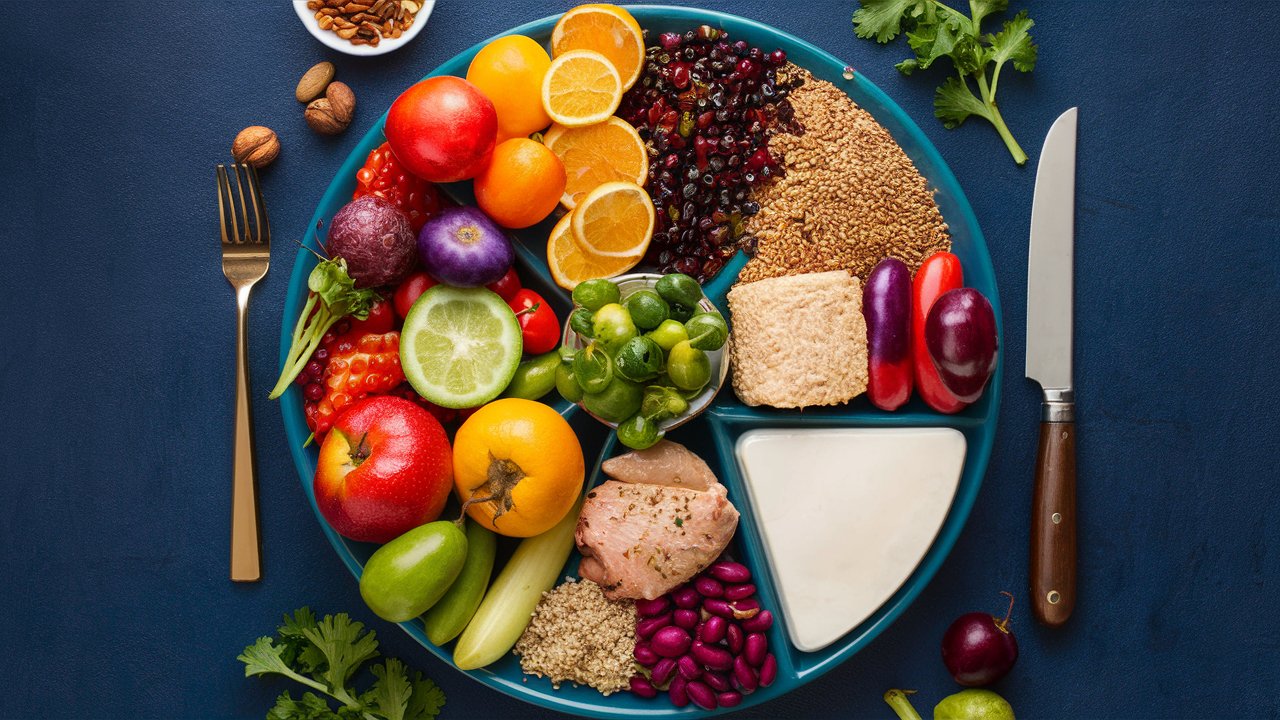 The first key component of a balanced diet is to have carbohydrates to provide you with energy and fuel up your body. You can have carbohydrates in the form of whole grains, fresh fruits, and vegetables along with legumes.
The first key component of a balanced diet is to have carbohydrates to provide you with energy and fuel up your body. You can have carbohydrates in the form of whole grains, fresh fruits, and vegetables along with legumes.
Proteins:
Proteins are the next crucial factor for having balanced meals, they help you in building and repair your muscles. There are both plant and animal-based proteins to help you produce enzymes and hormones. Now the sources of proteins can be incorporated from various sources such as lean meats, poultry, fish, eggs, dairy products, legumes, and nuts.
Fats:
These fats are not those unhealthy ones found in junk foods that lead to unhealthy weight gain, the healthy fats help you to store energy, protect organs, and support cell growth. You can get these good fats from various sources such as avocados, nuts, seeds, olive oil, and fatty fish.
Vitamins & Minerals:
No less than the above-mentioned these micronutrients in the form of vitamins and minerals also play a key role in keeping you healthy because they support immune function, energy production, and bone health. You can get these from a variety of fresh fruits, vegetables, dairy products, and lean meats to boost your health and vitality.
Water:
There is no healthier individual without water or hydration because water plays a key role in all of your bodily functions along with digestion, nutrient absorption, and temperature regulation. Having always water might sound boring for a few people so along with water you can also have herbal teas, and hydrating fruits like cucumbers and melons for hydration purposes.
Balanced diet chart:
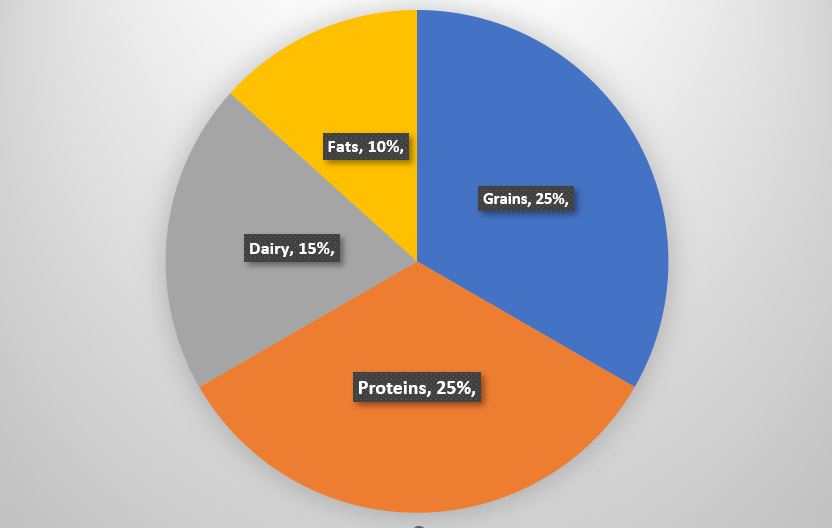
The Right Dietary Plan for Weight Gain With a Balanced Diet:
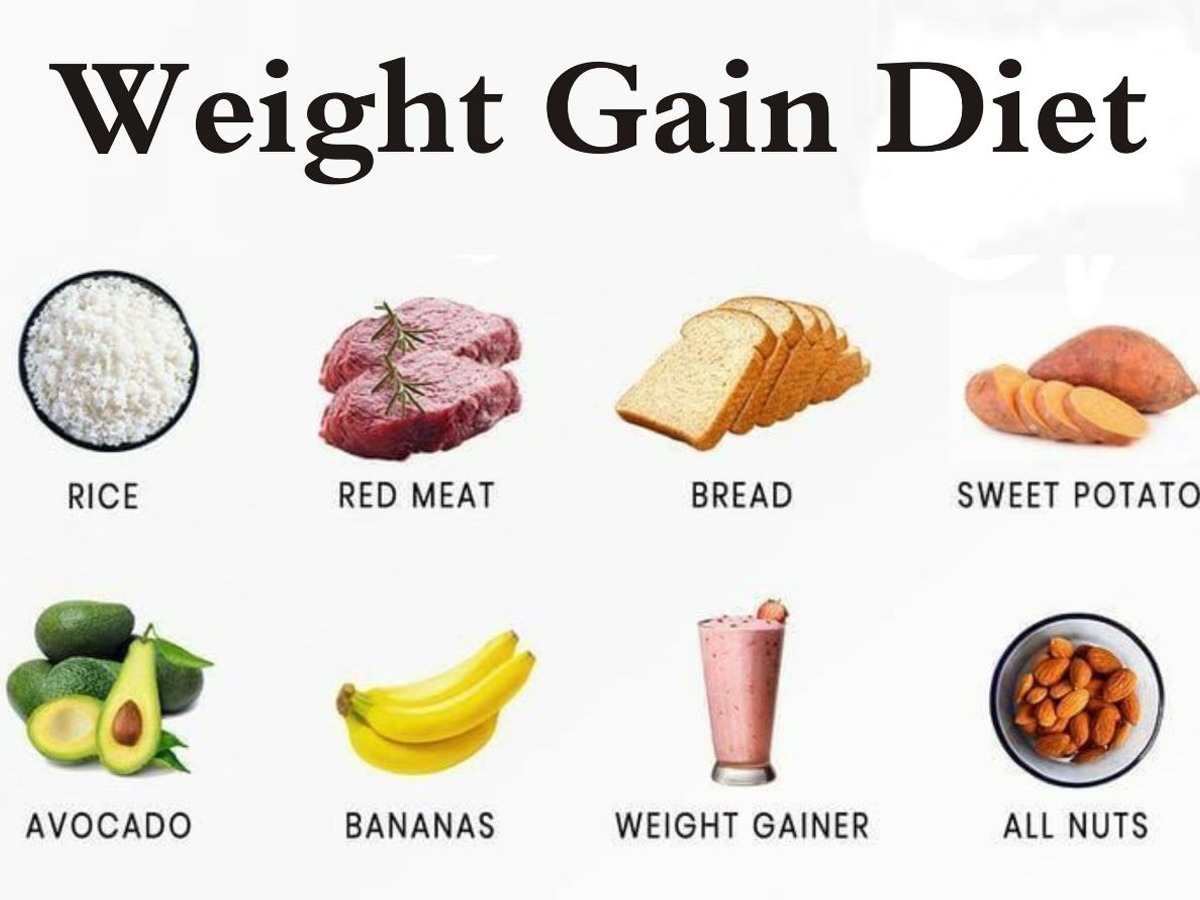 Increase your calorie intake while maintaining a healthy diet if you want to gain weight. This is an example plan.
Increase your calorie intake while maintaining a healthy diet if you want to gain weight. This is an example plan.
Breakfast -eggs, fruits, and whole grain bread.
A banana, oat, and protein powder smoothie.
Mid-afternoon snack- Greek yogurt topped with almonds and honey.
Lunch - grilled chicken breast, rice/roti, and veggies, along with whole pulses curry or dal.
Snack during the afternoon peanut butter and banana sandwich/ cottage cheese with almonds and a few fruits.
Dinner – dal khichdi with grilled paneer and sauté vegetable.
Women's Balanced Diet Chart:
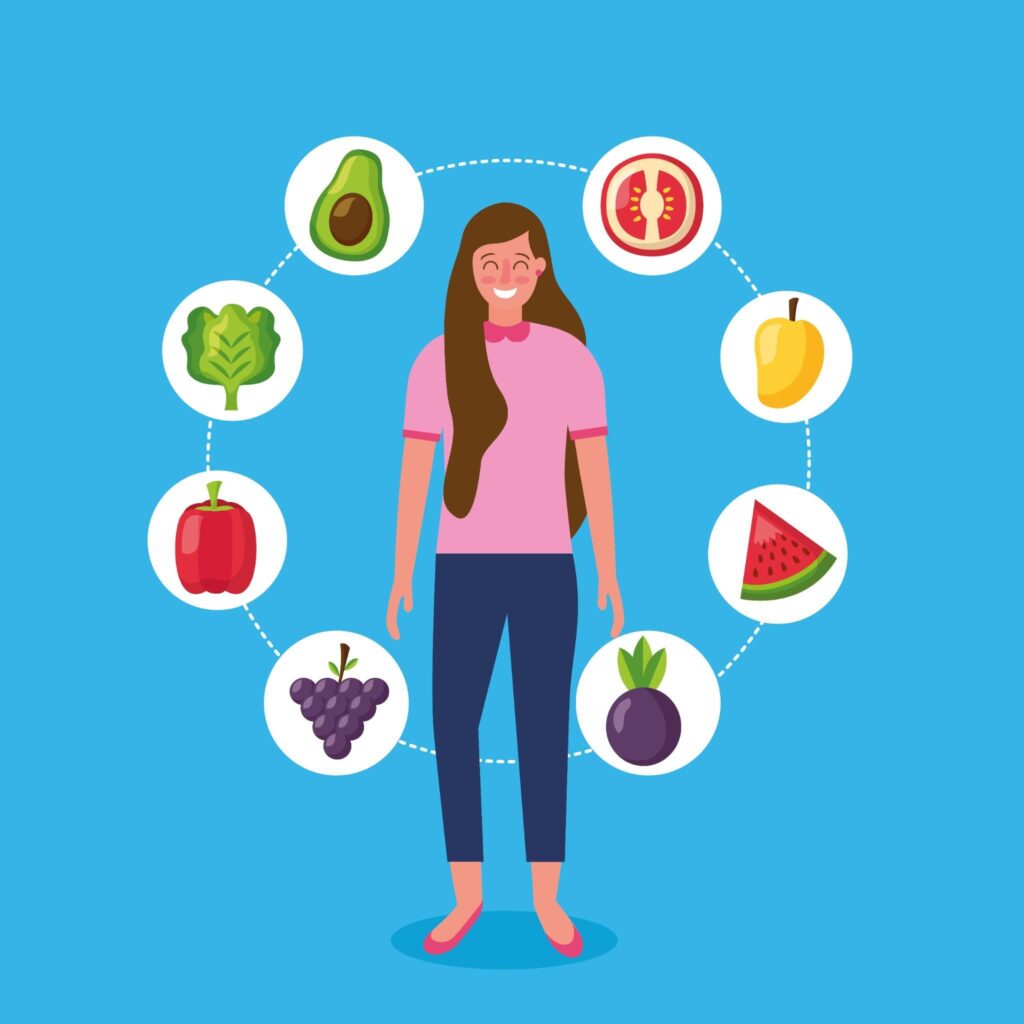 Women's dietary requirements are distinct, particularly about iron and calcium. Here’s a balanced diet chart for women:
Women's dietary requirements are distinct, particularly about iron and calcium. Here’s a balanced diet chart for women:
Early morning: Almond 6 nos with 4 dates
Morning breakfast: Upma / idly with sambar
Mid-morning: A bowl of cut fruits along with buttermilk
Lunch: Rice/roti, curd, Dal, salad, stir fry vegetable
Evening: Sprouts salad
Dinner: Roti, Pulses curry, sauté vegetable
Also read, The Ultimate Weight Loss Diet Chart for Indian Vegetarian Men
Balanced Diet Chart for a Week
Creating a weekly plan ensures variety and nutritional balance. Here’s a sample week:
Days |
Breakfast |
Lunch |
Dinner |
| Monday | Oatmeal with honey and berries | Quinoa salad with mixed vegetables | Grilled paneer Roti wrap with salad |
| Tuesday |
Smoothie with spinach, banana, and almond milk |
Dal khichdi, curd sauteed vegetable | Roti, Rajma, Salad |
| Wednesday | Scrambled eggs with whole-grain toast | Vegetable rice, mixed dal, sauteed vegetables, curd | Roti, stir-fried vegetables, chole |
| Thursday | Greek yogurt with granola | Curd rice, sprout salad, sauteed vegetable | Roti, moong dal, mixed veg curry |
| Friday | Daliya upma with sambar | Roti, palak paneer, salad | Egg roti roll with stir fry vegetable |
| Saturday | Besan chilla with fresh fruit | Rice/ roti, dahi kadi, dal, stir fry vegetables | Roti, soya chunks curry salad |
| Sunday | Spinach pear Smoothie bowl with mixed fruits | rice/roti, rajma, curd, Salad | Veggie burger with a side without mayonnaise, with a big bowl salad |
Importance of Balanced Diet Chart:
Nutrient Supply:
The first importance of a balanced diet is that it will ensure that your body is receiving all necessary macro and micronutrients in the right proportions. When your body receives all of them in the right proportions they will support you with all bodily functions, including growth, immune response, and energy production.
Energy Levels:
 Next, when you have proper nutrition by having a balanced diet, it provides the energy needed for daily activities. Carbohydrates which are one of the key components of a balanced diet are the main source of energy, while proteins and fats also contribute to sustained energy levels throughout the day.
Next, when you have proper nutrition by having a balanced diet, it provides the energy needed for daily activities. Carbohydrates which are one of the key components of a balanced diet are the main source of energy, while proteins and fats also contribute to sustained energy levels throughout the day.
Disease Prevention:
Most of the chronic diseases nowadays that happen at an early age are mainly due to unhealthy eating habits so, consuming a balanced diet helps prevent chronic diseases such as obesity, diabetes, cardiovascular diseases, and certain cancers. Also, it is reported that nutrient-rich foods enhance the immune system by promoting overall health.
Weight Management:
Obesity is also one of the risk factors for most of the diseases a balanced diet helps maintain a healthy weight by providing you with a proper balance of nutrients and controlling calorie intake.
Mental Well-being:
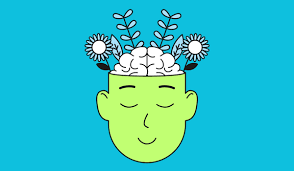 Last but not least now regardless the age most people have disrupted mental health healthy diet is associated with better mental health. Nutrients like omega-3 fatty acids, vitamins, and minerals that you incorporate in a balanced diet are crucial for brain function and can reduce the risk of mental health disorders such as depression and anxiety.
Last but not least now regardless the age most people have disrupted mental health healthy diet is associated with better mental health. Nutrients like omega-3 fatty acids, vitamins, and minerals that you incorporate in a balanced diet are crucial for brain function and can reduce the risk of mental health disorders such as depression and anxiety.
Benefits of a Balanced Diet
Improved Digestion:
Most of you might have a few digestive issues while eating out at places that are meant to be unhealthy, but when you follow a diet high in fiber from fruits, vegetables, and whole grains promotes healthy digestion and prevents constipation. Also, fiber is known to help maintain a healthy gut microbiome.
Stronger Bones and Teeth:
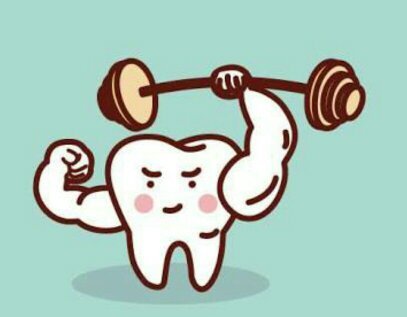 A balanced diet is enriched with nutrients like calcium and vitamin D, found in dairy products and leafy green vegetables, which are vital for maintaining strong bones and teeth, reducing the risk of osteoporosis and dental issues. So if you are someone with weakened bones and dental issues it's time for you to switch on to a healthy and balanced diet to keep your bones and teeth healthy and strong.
A balanced diet is enriched with nutrients like calcium and vitamin D, found in dairy products and leafy green vegetables, which are vital for maintaining strong bones and teeth, reducing the risk of osteoporosis and dental issues. So if you are someone with weakened bones and dental issues it's time for you to switch on to a healthy and balanced diet to keep your bones and teeth healthy and strong.
Better Skin & Hair Health:
There are vitamins and antioxidants present in fruits and vegetables that directly contribute to healthy skin and hair by reducing inflammation and promoting collagen production. Having a balanced diet results in a clearer complexion and reduced signs of aging with strong hair too.
Enhanced Immunity:
 To fight off all types of infections and diseases you need strong immune power when you have a balanced diet rich in vitamins A, C, and E, and minerals like zinc and selenium strengthening the immune system, helping the body fight off infections and disease-causing organisms.
To fight off all types of infections and diseases you need strong immune power when you have a balanced diet rich in vitamins A, C, and E, and minerals like zinc and selenium strengthening the immune system, helping the body fight off infections and disease-causing organisms.
You can also read more on a healthy diet.
Conclusion
A balanced diet is vital for maintaining health, supporting growth, and achieving weight goals. Whether you're planning for weight gain, creating a diet for women, or designing a weekly menu, ensure your diet is varied and includes all essential nutrients. With a balanced approach, you can enjoy a healthier, more vibrant life.
